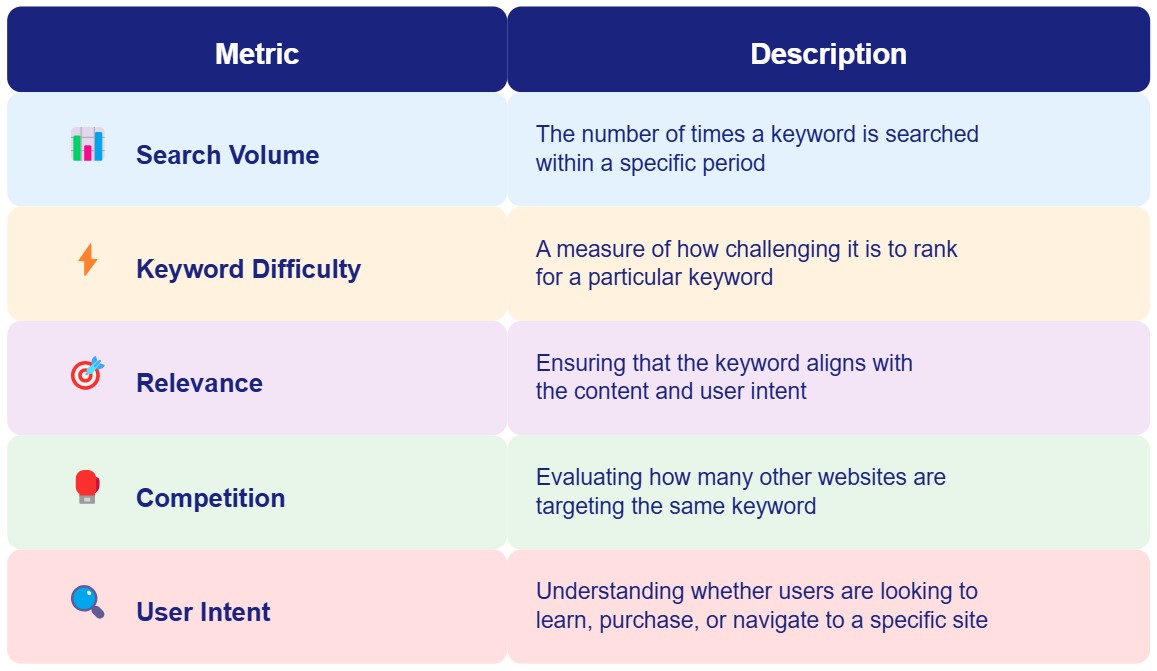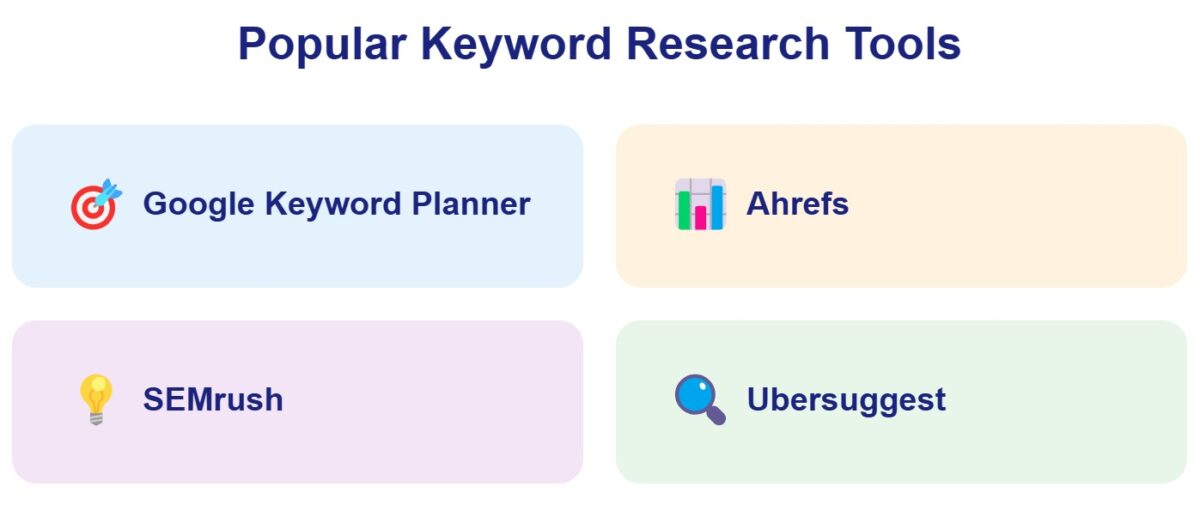Did you know that 68% of online experiences start with a search engine query? If you’re serious about getting found online, keyword research isn’t just helpful—it’s absolutely essential. Whether you’re running a small blog or managing a major e-commerce site, mastering the elements of keyword research can make or break your online success.
This comprehensive keyword research guide will show you exactly how to do keyword research that drives real results and helps you maximize your search engine positioning.
What is Keyword Research?
Keyword research is the process of discovering and analyzing the actual search terms people type into Google, Bing, and other search engines. It’s like being a detective—you’re uncovering the exact words your potential customers use when they’re looking for what you offer.
Here’s a powerful statistic: businesses that conduct thorough keyword research are 3.5 times more likely to succeed with their content marketing efforts (according to SEMrush’s 2023 report). That’s not a coincidence—understanding how to research SEO keywords is the foundation of creating content that both users and search engines love.
Why is Keyword Research Important in SEO?
The importance of keyword research in SEO goes way beyond just rankings. Here’s what proper keyword research actually does for your business:
Reveals What Your Customers Really Want: Keywords are like a direct line into your audience’s minds. They show you exactly what problems they’re trying to solve and how they think about those problems.
Guides Your Content Strategy: Instead of guessing what to write about, you’ll know exactly which topics will drive traffic and conversions.
Uncovers Competitor Weaknesses: Smart keyword analysis reveals gaps in your competitors’ strategies—opportunities you can exploit to steal their traffic.
Improves Your SEO Performance: When you target the right keywords, you’re not just getting more traffic—you’re getting better traffic that actually converts.

Core Elements of Keyword Research
Understanding the elements of keyword research means looking at several key factors that determine whether a keyword is worth targeting:
Search Volume: How many people search for this term each month? But here’s the thing—high volume isn’t always better. Keywords with 100-1,000 monthly searches often convert better than high-volume terms.
Keyword Difficulty: How hard it will be to rank for this keyword? Focus on keywords with difficulty scores under 40 for quicker wins.
Search Intent: This is huge. Are people looking to learn something (informational), find a specific site (navigational), or make a purchase (transactional)? Matching intent is crucial for improving relevance for search engine algorithms.
Relevance: Does this keyword actually relate to what you offer? Irrelevant traffic is worthless traffic.
Competition: How many other sites are fighting for this keyword? Sometimes it’s better to be a big fish in a small pond.

How to Do Keyword Research (Step-by-Step)
1. Start with Seed Keywords
Think about the main topics your business covers. Don’t overthink this—just brainstorm 5-10 broad terms related to what you do. Talk to your sales team and customer service reps, too—they often know exactly how customers describe your products or services.
2. Use Professional Keyword Research Tools
You need the right tools to do keyword research for website success. Here are the most reliable options:
- Google Keyword Planner: Free and directly from Google
- Ahrefs: Excellent for competitor analysis and keyword difficulty
- SEMrush: Great all-around tool with comprehensive data
- Ubersuggest: Budget-friendly option with solid features

3. Spy on Your Competitors
Find your top 10 competitors in search results, then use competitive analysis tools to see what keywords they’re ranking for. Look specifically for keywords where they rank in positions 4-10—these are your best opportunities to outrank them.
4. Analyze the Numbers That Matter
Don’t get caught up in vanity metrics. Focus on:
- Realistic search volumes (100-1,000 monthly searches often convert best)
- Manageable difficulty scores (under 40 for faster results)
- Clear commercial intent (these convert 2.8x better than informational keywords)
5. Group Keywords by Search Intent
This step is crucial and demonstrates why is keyword research important in seo:
Informational Keywords (80% of all searches): People want to learn something. Create comprehensive guides and how-to content. Target featured snippets—they appear in 19% of searches.
Navigational Keywords (10% of searches): People are looking for a specific brand or website. Focus on clear site architecture and brand-related terms.
Transactional Keywords (10% of searches): These are your money keywords. People are ready to buy. Optimize these for mobile since 79% of purchase-related searches happen on phones.

6. Refine and Prioritize Your List
Remove keywords with less than 2% click-through potential. Prioritize terms with clear commercial intent. And remember—update your keyword list quarterly because 15% of Google searches are completely new every month.
Keyword Research for Different SEO Strategies
Local SEO
Focus on location-specific keywords like “plumber in Denver” or “best pizza Brooklyn.” Make sure your Google My Business listing includes these local terms naturally.
E-commerce SEO
Target product-specific keywords and transactional terms. Use words like “buy,” “discount,” “best price,” and “shop now.” Don’t forget to research competitor product listings for gaps you can fill.
Technical SEO
Optimize your meta tags, URL structures, and schema markup with your target keywords. Keep URLs short and descriptive—both users and search engines prefer this.
Enterprise SEO
Scale your keyword strategy across large websites by balancing branded and non-branded terms. Use AI tools for content automation, but always maintain keyword consistency across departments.
Common Keyword Research Mistakes to Avoid
Targeting Zero-Volume Keywords: If nobody searches for it, why target it?
Ignoring Search Intent: Ranking for the wrong intent means traffic that bounces immediately.
Never Updating Your Strategy: Search trends change constantly. What worked last year might not work today.
Focusing Only on High-Volume Terms: Sometimes a keyword with 50 monthly searches converts better than one with 5,000 searches.
Frequently Asked Questions
How often should I do keyword research?
At a minimum, conduct thorough keyword research quarterly. But keep an eye on trends and update your strategy whenever you notice significant changes in your industry.
Can I rank with only long-tail keywords?
Absolutely! Long-tail keywords are often less competitive and bring highly targeted traffic. However, the best approach combines long-tail and broader keywords for maximum impact.
What tools are essential for keyword research?
Start with Google Keyword Planner (it’s free), then consider investing in Ahrefs or SEMrush as your budget allows. These tools provide the data you need to make informed decisions.
How do I track keyword performance?
Use Google Analytics and Google Search Console to monitor rankings, traffic, and user engagement. Set up regular reporting to track your progress over time.
Build Your Winning Keyword Strategy
The importance of keyword research in SEO can’t be overstated—it’s the foundation that everything else builds on. When you understand how to do keyword research properly, you’re not just optimizing for search engines; you’re connecting with real people who need what you offer.
Remember, keyword research isn’t a one-time task. It’s an ongoing process that requires regular attention and updates. Stay consistent, focus on user intent, and don’t be afraid to adjust your strategy based on what the data tells you.
Ready to take your keyword research to the next level? Understanding ranking factors and implementing a data-driven approach will set you apart from competitors who are still guessing.
If you want to skip the learning curve and work with experts who live and breathe SEO, Indexed Zone SEO is here to help. We’ll handle the complex keyword research while you focus on what you do best—running your business.



